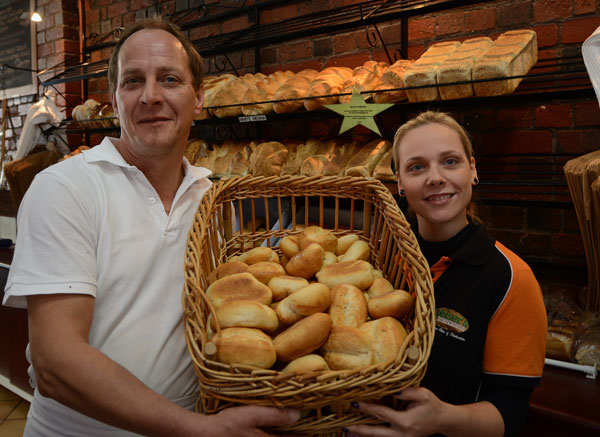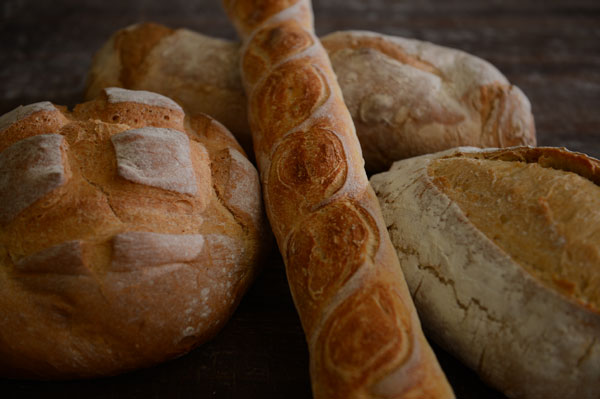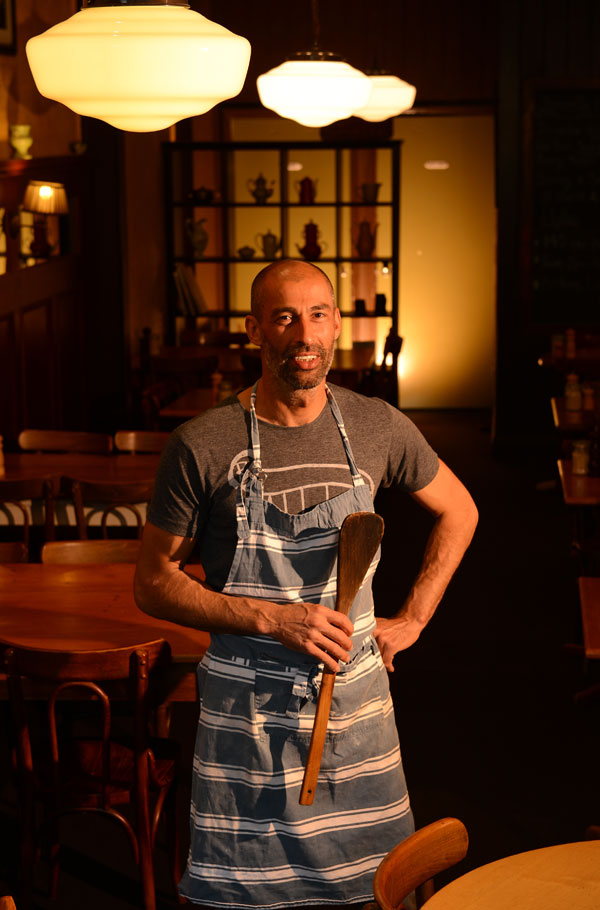
YOU know that oddly satisfying moment of tearing off a large chunk of bread from a fresh loaf and dunking it into your favourite soup? Where you let the bread soak up the soup just a little before you rip it apart with your teeth – it’s part soggy, part crunchy, all delicious. That’s one of my favourite winter experiences. It was hard not to devour every freshly baked loaf in sight when I visited the bakeries of Geelong’s Matt Santoro, Laurent Praud and Erwin Halle.
Words: Cherie Donnellan
Photos: Reg Ryan
Papa Mio’s Matt Santoro spent six months perfecting his signature recipe for crusty Italian ciabatta at his Corio Street bakery. It might seem like a long time to spend making a loaf of bread but the hundreds of weekly customers buying Matt’s ciabatta seem to appreciate his patience.
“When I got the recipe right, I started off making a two kilo batch a day. Now it’s my biggest line, I make up to a 50 kilo batch a day.”
And now he’s doing the same with his organic sourdough. Papa Mio’s sourdough recipe harks back to the methods used long before you could buy bread from a supermarket shelf, Matt says.
“Sourdough should only have three ingredients, flour, salt and water.”
Oh, and a natural leaven, too. He believes that not only does bread taste better when it’s made with natural ingredients but there has been a significant rise in the number of self-aware consumers who want quality, nutritionally-rich foods.
Matt says customers shouldn’t be fooled by supermarkets and large franchise bakeries touting “natural” ingredients in their bread.
“People are slowly learning about what good bread is, but it’s hard [for artisan bakers] when you go into bakeries that say proper sourdough, and it’s not sourdough. It’s chemicals that are put in it to make it taste sour.”
Production pressures – making products fast and en masse – is often responsible for larger companies being unable to bake “authentically”.
Perhaps that’s why Geelong’s chefs prefer to serve Papa Mio’s breads in their restaurants and cafes.
“Our biggest customer is Geelong Fresh Foods on Pakington St [and] we [supply] Waterfront Seafood, La Parisian restaurant, Wharfshed café, Chifley on the Esplanade, Ripples By the Bay, Ebony and Ivory…”
The list goes on.
Matt says the wholesale side of the business developed through word-of-mouth. His father Barry’s former wholesale Breakwater Bakery, which had been servicing Geelong and Surf Coast restaurants since 1977, also helped Papa Mio’s reputation.
In fact, Matt learned his baking secrets from Barry, beginning as a bakery assistant at the tender age of 11.
“I used to work on Saturdays with him when I was 11 years old, just for fun. And then I just developed a passion for it. It wasn’t something I was forced into, I just enjoyed it.”
By the time Matt was 15, he became so determined to follow in this father’s footsteps that he left school and joined his father baking full-time. That’s where he learned the tricks behind his father’s sought-after continental bread. But Matt jokes the rolls (sorry, roles) have reversed.
“He sort of takes my advice on the sourdoughs and the ciabattas because they’re the lines I’ve [developed] and it’s like I’m teaching him,” he laughs.
When James Street Bakery closes for the day, Laurent Praud’s work day begins. His name may have given away his French heritage but so could one bite of his mouth-watering macarons. He’s pretty nifty in baking a scrumptious sourdough, too.
Laurent attributes his love of food to growing up in a small, French countryside town where food was sourced “from the garden or sharing with neighbours”. He adopted his parents’ appreciation of food and wine but he also couldn’t ignore the stories his grandfather – a baker – told.
“My grandfather was a baker. He was telling me all these stories about how he used to bake. He had an old oven…and he was telling me about mixing the bread by hand and all these things of things.
“I guess that probably triggered it.”
Laurent began an apprenticeship with a baker in a nearby town and soon learned to perfect the baker’s specialty, sweet bread known as brioche.
But Laurent believes Australians are yet to truly adopt the French penchant for sweeter breads, particularly at breakfast.
“People [in France] love their croissants and pain au chocolats in the morning, cooked fresh.
“And Danish pastries. But not here.
“I think maybe because it’s a health thing. People don’t want to have to go and run 10 kilometres after eating these things,” Laurent laughs.
He also considers the Australian mentality towards visiting bakeries “very different”.
“I don’t see people going to the bakery in the morning to buy their fresh baguette. I think in France it’s a tradition in some ways. People just do it because it’s been [a habit] for a long time. People in Australia haven’t got that mentality.
Maybe one day it will come. Maybe in Melbourne it’s a bit more obvious, but here (Geelong) I don’t think it’s quite there yet.”
Laurent agrees with Matt that when it comes to artisan breads, customers want naturally cultivated breads.
“I suppose people are a bit more aware of what they want to eat. They want it to be as natural as it can be.”
Hanz Weiser handpicked Erwin Halle – from Germany – to take over his Pakington Street bakery when Weiser decided to retire. Erwin says as a 20-something at the time, he jumped at the chance to learn the art of continental baking in a different environment. After all, he’d already trained in bakeries throughout Europe.
“I’ve worked in a couple of places that still had the original woodfire ovens. [Shortly after completing my apprenticeship] I travelled a little bit around Europe to get a bit more experience – in all different styles. In Europe, if you move from one part of the [continent] to another, the tradition is totally different.”
But Erwin remembers artisan breads had yet to set Australian tongues wagging when he first arrived.
“It was a big, big difference.
“Australian bakers at the time were more into [baking] just white blocks. Some bakers did some white viennas, some normal wholemeal and multigrain. That was it.
“Whereas now you get artisan bread virtually everywhere.”
Erwin says like Matt, he has noticed supermarkets trying to pass off additives with fancy labelling. He’s not convinced even additives like chia seeds aid nutrient content.
“My research has told me that it’s more propaganda. You get more vitamins from other products than the chia seed.”
His daughter Sandy Hoffman, store manager of Weiser’s Bell Park, says health messages about low GI or low-carb often confuse customers.
“Customers often ask for something like low-GI white bread but we don’t cater for it because we believe in the natural process.
“Or we’d be steering [them] away from the white and saying ‘well if you want something that healthy for you, why not try a multigrain, wholemeal base?’ Multigrain’s got all the seeds, it’s going to aid digestion because it’s going to make your stomach work for it, but with a wholemeal base it’s going to keep you fuller for longer.”
Erwin’s personal preference is rye, light or dark.
“Twelve hours before we try to make the dough, we have to ferment the rye flour… without any chemicals. It’s a natural process. And we’ve had the sourdough culture here for…well since I started.”
Mmmm…I’m hungry.










